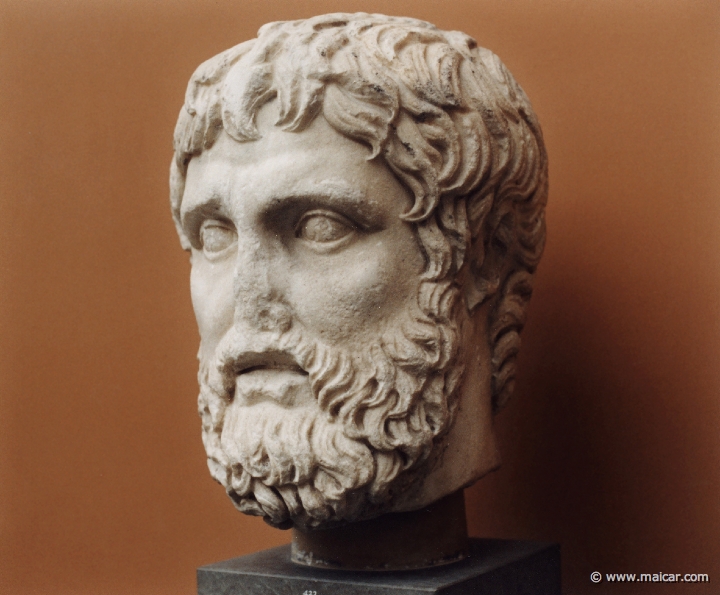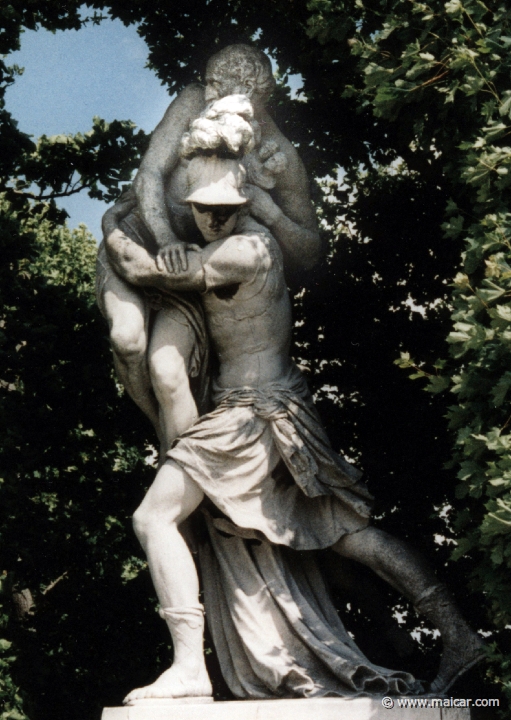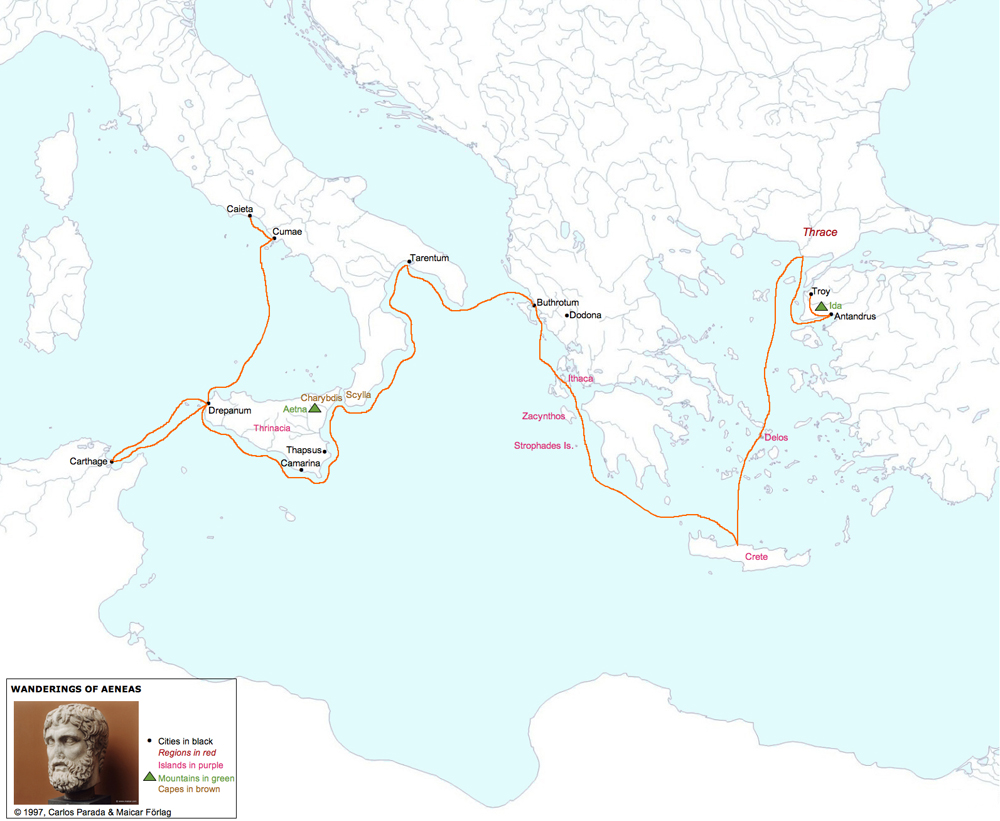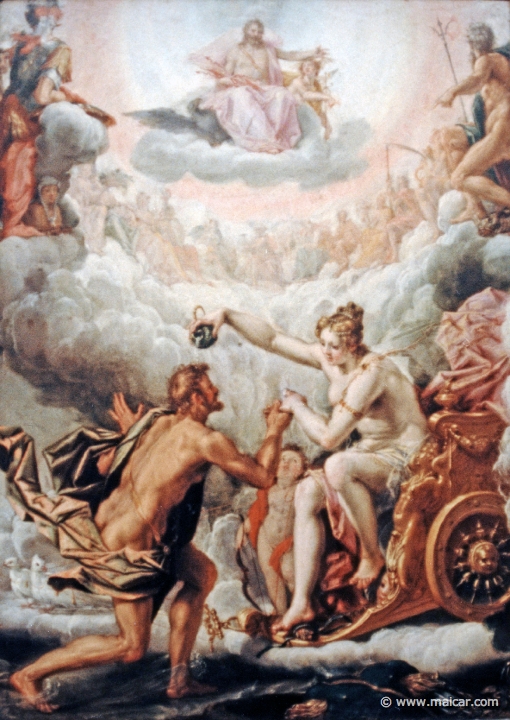|

|
1636: Aeneas. Roman copy from II c. AD of bronze statue from 12 BC. Glyptotek, Copenhagen.
|
|
|
"Learn courage from me, and true toil; from others the meaning of fortune." (Aeneas to his son Ascanius 2. Virgil, Aeneid 12.435).
|
|
At the fall of Troy, Aeneas, who had been Leader of the Dardanians during the Trojan War, left the city in flames, and after wandering in the Mediterranean sea, came to Italy and founded the state that later became Rome.
Birth and Childhood
Aeneas was born from the union of a mortal, Anchises 1, and a goddess, Aphrodite. Some say that it was Zeus himself who aroused in Aphrodite the desire to be joined with a mortal man, so to prevent her from saying mockingly that she had succeeded in joining all the gods to mortals. Aphrodite came to Anchises 1 in the form of a beautiful maiden, asserting that she was a mortal woman—the daughter of one Otreus. She explained to the incredulous Anchises 1 that she spoke his language because she had been brought up by a Trojan nurse. Anchises 1 was taken by desire, but when they had made love, Aphrodite revealed her true identity, and then Anchises 1 feared that the gods would destroy him for having slept with a goddess. But Aphrodite, who herself grieved for having laid in the bed of a mortal man, assured him that he was dear to the gods and that nothing would happen to him, provided he would say their child was the offspring of a nymph, for Aphrodite disposed that the NYMPHS would rear Aeneas and that, as soon as he was a boy, he would be restored to his father. According to some, Anchises 1, having drunk much wine, told his friends that he was the lover of the goddess, and for this reason he was struck by Zeus' thunderbolt. Others say, however, that he killed himself, and till others assert that the thunderbolt just crippled him.
Wounded in battle
During the Trojan War, Aeneas, who some time before had been driven from Mount Ida by Achilles, was wounded by Diomedes 2 and, having fainted, would have died if his mother had not come to his rescue. Aphrodite herself was wounded by Diomedes 2 on this occasion, but then Apollo took over the protection of the Aeneas, removing him from the battle to the citadel, where his temple stood. In the sanctuary, Leto and Artemis healed Aeneas and made him even stronger. But for those fighting, Apollo fashioned a phantom of Aeneas, so that Achaeans and Trojans killed each other round it, until the real Aeneas, having recovered, returned to the field.
Poseidon's Prophecy
On another occasion, when the gods had become more involved in the fighting, Apollo urged Aeneas to challenge Achilles and to fight with him in single combat. Aeneas was almost killed, but Poseidon rescued him, explaining to the other gods:
"Even Zeus might be angry if Achilles killed Aeneas, who after all is destined to survive and to save the House of Dardanus from extinction ... Priam's line has fallen out of favor with Zeus, and now Aeneas shall be King of Troy and shall be followed by his children's children in the time to come." (Poseidon to the gods. Homer, Iliad 20.300).
This way of speaking would have pleased Aeneas himself, since he had a grudge against King Priam 1 for not giving him his due. Aeneas and Priam 1 represent two royal lines with different interests, as Achilles reminded Aeneas when the latter was eager to fight against him:
"Do you propose to fight me in the hope of stepping into Priam's shoes and becoming King of the Trojans? Your killing me will not make Priam abdicate for you. He has sons of his own ..." (Achilles to Aeneas. Homer, Iliad 20.180).
At the end of the war
Some say that when the Trojan War was over, Aeneas was given as a prize to Neoptolemus, who had also received Andromache, wife of Hector 1. Others tell that when the Trojans debated what they ought to do with the WOODEN HORSE, there were three opinions: some wanted to hurl the WOODEN HORSE down from the rocks, others wished to burn it, and still others were for dedicating it to Athena. This third opinion prevailed, and the Trojans, believing the war was over, turned to feasting. It was then that the two serpents appeared, which destroyed the seer Laocoon 2 and his sons after he had warned his fellow citizens:
"Is it thus you know Odysseus? Either enclosed in this frame there lurk Achaeans, or this has been built as an engine of war against our walls, to spy into our homes and come down upon the city from above; or some trickery lurk therein. Trojans, trust not the horse. Whatever it be, I fear the Greeks, even when bringing gifts." (Laocoon 2 to the Trojans. Virgil, Aeneid 2.48).
What happened to Laocoon 2 alarmed Aeneas and his followers in such a way that they withdrew to Mount Ida and were not at Troy when the city was sacked.
|

|
Aeneas, in a remembered gesture of piety, carries his father out of Troy. 0734: Aeneas and Anchises. Statue from the 18C. Schönbrunn Schloß, Austria.
|
|
Aeneas' piety
However, others say that Aeneas was indeed at Troy when the city was burned down and that he, carrying his aged father on his back, was allowed by the Achaeans, on account of his piety, to leave the town. Aeneas took also his son Ascanius 2 (later called Iulus 1), and his household gods, the PENATES (see Other Deities), but his wife Creusa 2 became separated from him. Some affirm that Aeneas also took the Palladium with him, bringing it to Italy, but others say otherwise.
Aeneas and the fall of Troy
Still others assert that when the Achaeans came into the city, Aeneas occupied the citadel of Troy, which was fortified with its own wall, and there resisted the enemy who attacked the acropolis. This resistance, they say, allowed many Trojans to save their lives or escape slavery. Having in this way prevented the enemy from taking the whole city by storm, the flower of the army was saved, many lives rescued, and many of the city treasures preserved. The city was anyway lost, but Aeneas had the time to send out from Troy the women, the aged, and the children, putting them on the road to Mount Ida, together with an escort instructed to take possession of the strongest parts of the mountain. In the meantime, the Achaeans, being busy trying to capture the citadel, gave no thought to the multitude who was leaving the city. Aeneas himself, with the other part of the army, defended the citadel until Neoptolemus gained a foothold in a section of the acropolis. Then Aeneas opened the gates and retired, as they say, in good order, carrying with him his family, his household gods, and whatever he considered a treasure, either person or thing. Some have said that Aeneas betrayed the city of Troy, and that because of this service the Achaeans allowed him and his family to safely leave the city. Aeneas, they say, had been excluded from his prerrogatives by King Priam 1 and his son Paris, who could be thought to succeed his father after the death of Hector 1. So Aeneas overthrew the king and negotiated with the enemy.
Exile
Having left Troy, Aeneas came to Mount Ida, where he was joined by the inhabitants and troops which abandoned Dardanus and other cities when they saw, from the distance, the great fire rising from Troy. All these hoped to return home when the enemy had sailed away. But the Achaeans, having taken the city and demolished all surrounding forts, were determined to subdue all refugees in the neighboring territories. Perceiving the danger that threatened them, the Trojans in Mount Ida sent heralds to the Achaeans and an agreement was reached, which allowed Aeneas, as well as his people and valuables, to leave the Troad, once he had delivered all fortifications to the Achaeans. So at the foot of the mountain, Aeneas and his followers built a fleet of twenty ships, sailing in the first days of summer. But his son Ascanius 2, they say, came to Dascylium on the Propontis, in Phrygia, since he was invited by its citizens to rule over them. It is also told that Ascanius 2 remained there only until Astyanax 2, the son of Hector 1, was permitted by Neoptolemus to return home from Hellas and rule his country. For, according to this account, little Astyanax 2 was not murdered by the Achaeans during the sack of Troy, but taken prisoner by Neoptolemus.
End of Anchises 1
As for Anchises 1, some say that when Aeneas was in his way to Sicily, he came first to Laconia, founding the cities Aphrodisias and Etis, and that his father died there, being buried by Aeneas at the foot of the mountain called Anchisia after Anchises. Others tell that old Anchises 1 died when they sailed past Lilybaeum, Sicily's western promontory.
"Yet if you could live on such as now you are in look and in form, and be called my husband, sorrow would no then enfold my heart. But as it is, harsh old age will soon enshroud you, ruthless, wearying and deadly age which stands some day at the side of every man." (Aphrodite to Anchises 1 when they first met at Mount Ida. Homeric Hymn to Aphrodite 245).
|

|
Synopsis of Aeneas' wanderings
Aeneas built his fleet in Antandrus. He sailed first to Thrace where he met Polydorus 3's ghost. Then, after having been received in Delos by King Anius, he attempted to settle in Crete but failed. Later, having stopped in the Strophades Islands and Zacynthos and sailed past Ithaca, Aeneas came to Buthrotum in Epirus. From there, he crossed to Italy, skirting the waters of Tarentum, Lacinium and the Sicilian coast. On his first arrival to Drepanum, Aeneas lost his father. From Drepanum he sailed to Carthage where he met Queen Dido. After his love affair with the queen, Aeneas returned to Drepanum, later crossing to Italy. In Cumae he descended to the Underworld, ending his trip soon after in the harbor of Caieta.
|
|
First part of Aeneas' wanderings
In Thrace, where he came first, Aeneas received a warning from the ghost of Polydorus 3 (Priam 1's son), whom King Polymestor 1 of the Bistonians had treacherously murdered (see also Priam 1 and Hecabe 1):
"Get away from this cruel land, from these hard-fisted shores." (Ghost of Polydorus 3 to Aeneas. Virgil, Aeneid 3.44).
Next, he was received by Anius, king of Delos, where at the temple of Apollo he received instructions which he believed to mean that he ought to sail to Crete. However, famine and sickness waited for them in Crete, and when they left the island, the home-gods of Aeneas appeared to him and told him to sail to Italy. But having reached the Strophades Islands, they were plundered by the HARPIES.
In the island of Zacynthus, they were received in a friendly manner. The island is called after Zacynthus, son of Dardanus 1 and Batia 1, and brother of Erichthonius 1, an ancestor of Aeneas.
Later they arrived to Buthrotum in Epirus, where Priam 1's son Helenus 1 reigned, having married Andromache (wife of Hector 1 and, after the Trojan War, concubine of Neoptolemus until the latter's death). Helenus 1 gave Aeneas directions who allowed him to reach Drepanum in Sicily. Some say, however, that Aeneas marched two days from Buthrotum to Dodona, in order to consult the oracle, and that it was in Dodona that he met Helenus 1.
Thence they intended to sail to Italy, but a storm sent by Hera, who had not forgotten the outrage she suffered at Mount Ida on the occasion of the Judgement of Paris, carried them to Libya, where there was a city, Carthage, ruled by Queen Dido.
Queen Dido's story before Aeneas
Dido, daughter of Belus 2, an Assyrian, was a Phoenician who had left Tyre and founded Carthage. In Tyre she had been married to Sychaeus, a man of great status among the Phoenicians. Sychaeus, however, was murdered by Dido's brother Pygmalion 2, who was a great lover of gold and a man of power. Dido learned about what happened when her husband's ghost appeared to her, disclosing the crime, and urging her to flee the country. She then organised her friends for escape, and having come to Libya, she purchased land. The site was called "Bull's Hide" after the bargain by which she should get as much territory as she could enclose with a bull's hide. In that site she founded Carthage. Others tell that a Moor king called Iarbas, son of Zeus-Ammon, wished to marry Dido, who, being in love with Aenas, rejected him. Iarbas is also said to have given her the country where she founded her kingdom (Carthage). So, after Dido's death, Iarbas invaded the country. Dido's sister Anna 1, who had hoped that Dido would marry Aeneas, went then into exile, first in Malta and afterwards in Italy, where she met Aeneas again.
Extraordinary paintings
After his father's death at Drepanum in Sicily, Aeneas arrived to the prospering Carthage, where he discovered a series of frescoes depicting the Trojan War, and those who had fought in it. There were pictures of Agamemnon, Menelaus, Priam 1 and Achilles. He also recognised in the paintings the tents of Rhesus 2, who came from Thrace to fight at Troy and died the day after his arrival, killed by Odysseus and Diomedes 2.
Dido and Aeneas
|

|
2314: Venus receives Aeneas in Olympus. Painting by Peter de Witte called Candid, 1548-1628. Gemälde Galerie Kulturforum, Berlin
|
|
Queen Dido received the Trojans with hospitality, and fell in love with Aeneas. He, in turn, started to forget that he was meant to sail to Italy. But as he was superintending public works in Carthage, Hermes, sent by Zeus, came to him, and reproached him:
"So now you are laying foundations for Carthage, building a beautiful city to please a woman, lost to the interests of your own realm?" (Hermes to Aeneas. Aeneid 4.265).
Aeneas then, remembering his own destiny, decided to leave Dido and Carthage:
"In Italy lies my heart, my homeland. You, a Phoenician, are held by these Carthaginian towers, by the charm of your Libyan city." (Aeneas to Dido. Aeneid 4.345).
And when Dido would not accept the separation, Aeneas proclaimed:
"No more reproaches ... they only torture us both. God's will, not mine, says 'Italy'" (Aeneas to Dido. Aeneid 4.360).
Dido, who felt she had rescued Aeneas' lost fleet, saved his friends from death, taken a pauper and a castaway and shared her kingdom with him, could not see in Aeneas' decision more than betrayal and ingratitude. So on Aeneas' departure, Dido cast herself upon Aeneas' sword on a pyre, and upon her tomb it was written:
"Aeneas caused her death and lent the blade, Dido by her own hand in dust was laid." (Ovid, Heroides 8).
Aeneas descends to Hades
After landing once more in Sicily, Aeneas' fleet came to Cumae where he, led by the Sibyl, descended to the Underworld. There he met his father, and also Dido, who, reunited with her Tyrian husband, refused to talk to him. Some of those whom Aeneas met in the Underworld belong to the past, but others belong to the future, as those from the lineage of Alba Longa (see also AENEAS IN HADES), or his own son Silvius, who had not yet been born.
End of journey
Next Aeneas came to Latium, a land ruled by King Latinus 1 (son of Faunus 1, son of Picus, son of Cronos), whose daughter Lavinia 2, King Turnus of the Rutulians wished to marry. Turnus was son of King Daunus of Apulia, the same who gave his daughter and lands to Diomedes 2, when he landed in Italy after the Trojan War. Latinus 1, however, preferred to give his daughter to Aeneas, having learned from an oracle that she was fated to marry a foreigner. But his wife Amata encouraged Turnus, and because of the intrigue that ensued, a significant war broke out with many allies on both sides. This war only ended when Aeneas killed Turnus in single combat. After the war, he married Lavinia 2, and their son Silvius became ruler of Alba Longa.
Death
The circumstances of Aeneas' death are uncertain. Some affirm that Aeneas disappeared during a battle against the army of Mezentius (an ally of Turnus), but others say that he died in Thrace without ever reaching Italy, or that he, after having settled his people in Italy, returned home and became king of Troy, leaving the kingdom, after his death, to his son Ascanius 2.
It is also told that Aphrodite asked Zeus to make Aeneas immortal, and as Zeus granted her request, the river god Numicius washed away all of Aeneas' mortal parts, and Aphrodite anointed him with Nectar and Ambrosia, making him a god, whom the people later worshipped under the name of Indiges.